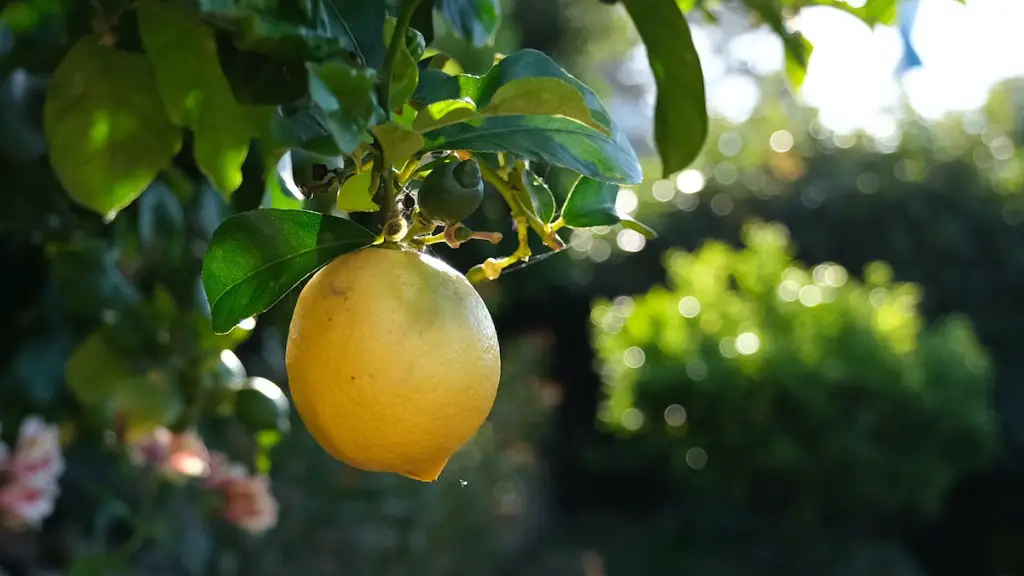Growing a lemon tree can be a rewarding and fulfilling experience. But, in order to grow it successfully and make it thrive, some basic things must be taken into account. Lemon trees usually require a lot of care to ensure their proper growth, and so below are some tips on how to make your lemon tree grow faster.
Watering
Watering is essential for the healthy growth and development of lemon trees. Watering should be done on a regular basis, depending on the weather conditions and the age of the tree. Young trees should be watered frequently, whilst mature trees can usually get by with less frequent watering. Watering should be deep, thorough and consistent. If the soil gets too dry, it can damage the roots of the tree and stunt its growth.
Pruning
Pruning is necessary to maintain the health and structure of the lemon tree. All dead or damaged branches should be removed, and any shoots growing in a direction which could potentially be harmful to the tree or its environment should also be cut off. The tree should also be trimmed regularly to combat excessive foliage or fruiting. Pruning not only helps the tree maintain its structure and promote healthy growth, but also stimulates it to send new shoots and eventually bear more fruit.
Fertilization
In order for a lemon tree to reach its full potential, regular fertilization is necessary. Fertilizer helps the tree reach its optimal development and should be applied in the spring and early summer, as well as in the late summer or autumn. When deciding on the type and amount of fertilizer, consider the age of the tree and the underlying soil type. The container soil should be checked for any deficiencies and supplemented with a balanced fertilizer for optimal growth.
Sunlight & Temperature
Lemon trees thrive in hot and humid climates, so make sure to check the weather and temperature conditions of your area before planting your tree. Whenever possible, make sure the tree is placed in direct sunlight, as this helps lemon trees to reach their full potential. If temperatures drop too low, cover the tree to protect it.
Container & Soil
The container in which you choose to grow your lemon tree is important in terms of drainage and ventilation. The soil should be nutrient-rich and well aerated, to promote healthy root growth. Soil should be replenished every few years to ensure optimal growth and the prevention of pests and diseases.
Protection from Pests and Diseases
Pests and diseases can pose a threat to your lemon tree, and so it is important to take steps to protect it. Research the types of pests and diseases that can affect your tree and take appropriate actions in order to protect it. Regularly inspect the tree for any signs of infestations and take action to remove them as soon as possible.
Regular Maintenance and Monitoring
Regularly check the tree’s progress and monitor any changes. Prune any dead or damaged branches, water it properly and supplement the soil with nutrients when needed. When the tree starts bearing fruit, be prepared to harvest and store it properly. If necessary, contact a professional, as they can provide valuable advice in order to make sure your lemon tree grows faster and healthily.
Mulching
Mulching is essential for lemon trees and should be done when planting and replanting the tree. Mulch helps retain moisture and protects against weeds, as well as imparting additional nutrients to the soil. Choose a suitable mulch material, such as straw, pine needles or wood chips, and cover a wide area around the tree’s roots. Make sure not to pile the mulch too high, as this can cause the roots to suffocate, and in some cases, promotes the growth of fungal diseases.
Staking
Stakes are highly advisable for young lemon trees, as they provide additional support against wind and heavy loads of fruits. Choose a sturdy stake, such as heavy wood or metal, and place it in a place where it cannot damage the tree’s roots. Tie the tree to the stake securely, making sure not to tie it too tightly. Check regularly for any loosening of the ties and for errant shoots which can be pruned.
Organic Fertilizers
Organic fertilizers can be highly beneficial for a lemon tree’s growth. They are usually derived from plant or animal sources and usually contain essential micronutrients for healthy growth. Choose a fertilizer which is specifically designed for citrus trees, as these usually contain more nitrogen, phosphorus and potassium. Apply the fertilizer around the tree’s base in April and August, and make sure it is completely mixed in with the soil.
Proper Irrigation
Lemon trees require careful irrigation management in order to achieve optimal growth and prevent desiccation. Water should be applied at least once or twice a week, and deep enough so it reaches down to the tree’s roots. If you live in a dry area, consider installing a drip irrigation system or a rain water harvesting system to ensure the soil is kept moist throughout the year.
Growth Potential
The potential for fast growth of your lemon tree will depend on the variety of tree you have chosen and the environmental conditions it is grown in. Different varieties require different levels of watering, pruning and fertilization, and this should be taken into account. Check its growth statistics to gain an understanding of the potential of your tree and plan out the steps necessary to reach its full potential.


